Swedish Jeans Brands
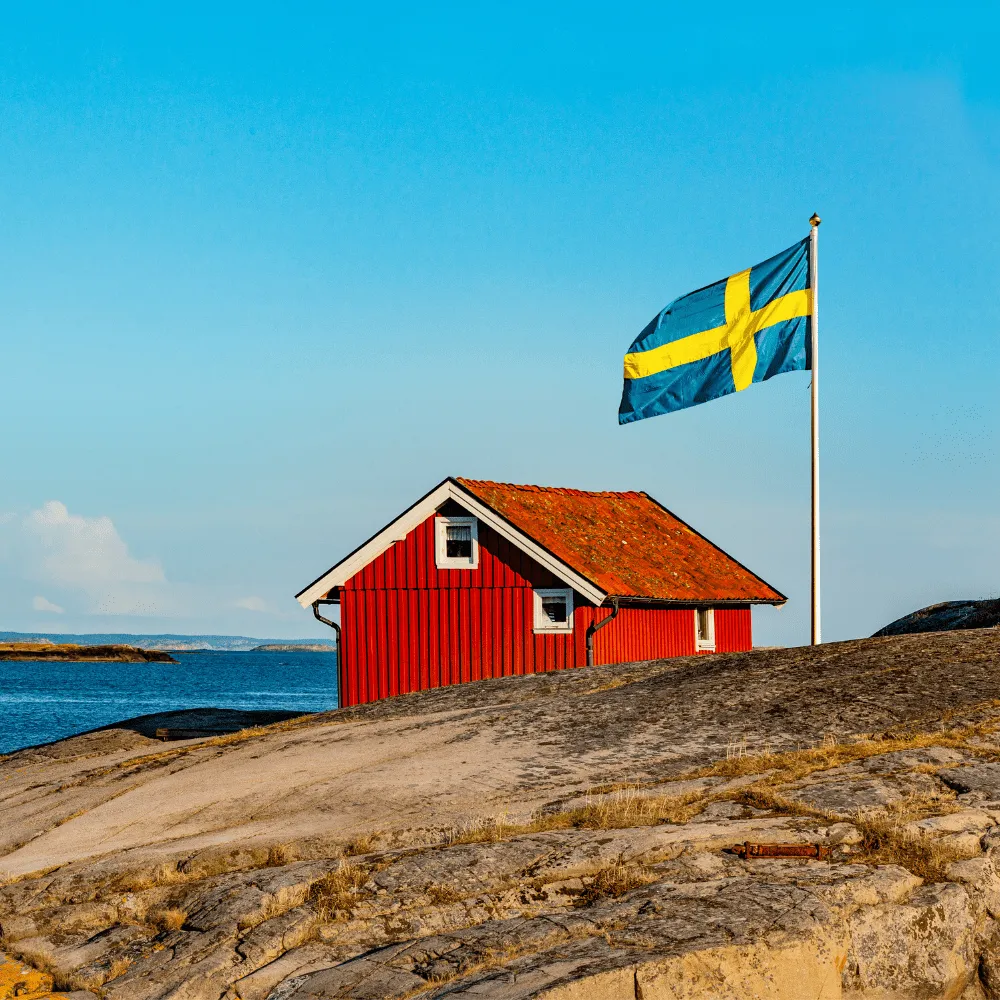
If you think Sweden is all cuckoo clocks and chocolate then you’re probably thinking of Switzerland but if you think Sweden is all Ikea and Abba, you’d be thinking of the right country but Sweden has much more to offer.
Of course Sweden does celebrate it’s historical icons but it also encourages entrepreneurialism and you’ll find a lot of small companies delivering highly qualitative products.
A handful of those are jeans companies.
Social Responsibility
Departing from the ”throw away fashion” trend of earlier decades the fashion industry today has a social responsibility to focus on sustainability. Companies have to analyze and consider their impact on society and the environment, running their business in a transparent, ethical manner to ensure long-term success and customer moral satisfaction. They have to consider things like material sourcing, manufacturing techniques and labor conditions to guarantee that their product meets today's consumer demands.
Nudie Jeans Co.
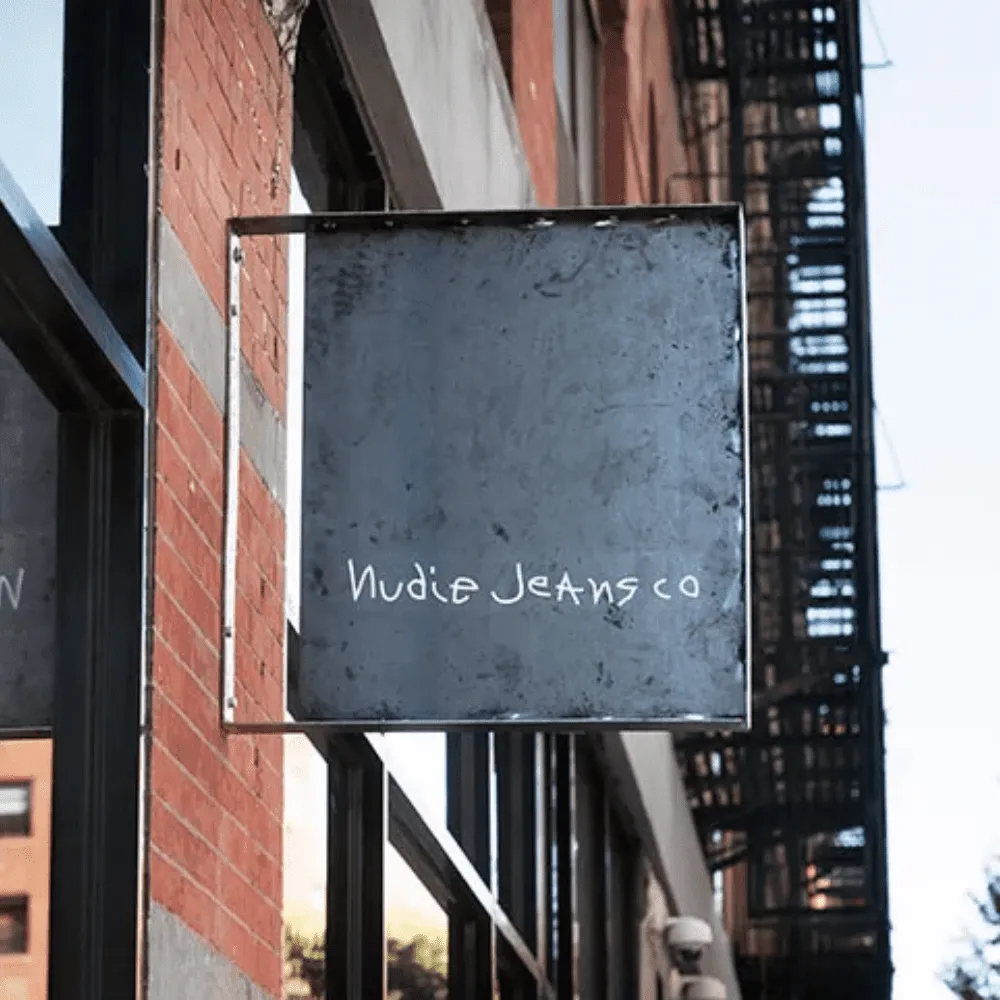
Nudie Jeans Co (NJC) have been around since 2001 and were founded by Maria Erixon in Gothenburg, a city on the West coast of Sweden. Their goal is to be the world’s most sustainable jeans brand and to help achieve this initiatives have been brought in to change the attitude towards clothing both by the industry and the consumer.
Along with more considered processes in production, NJC encourages repairing and re-cycling and offers a trade-in discount on new pairs of their jeans.
”Every pair of jeans we make is designed to be your 'forever jeans.' They're the kind you'll want to repair, not replace.The kind you'll hand down to your kids, who'll hand them down to theirs.We're not just making clothes; we're creating future classics. Clothes that become vintage, instead of garbage”
- Nudie Jeans Co.
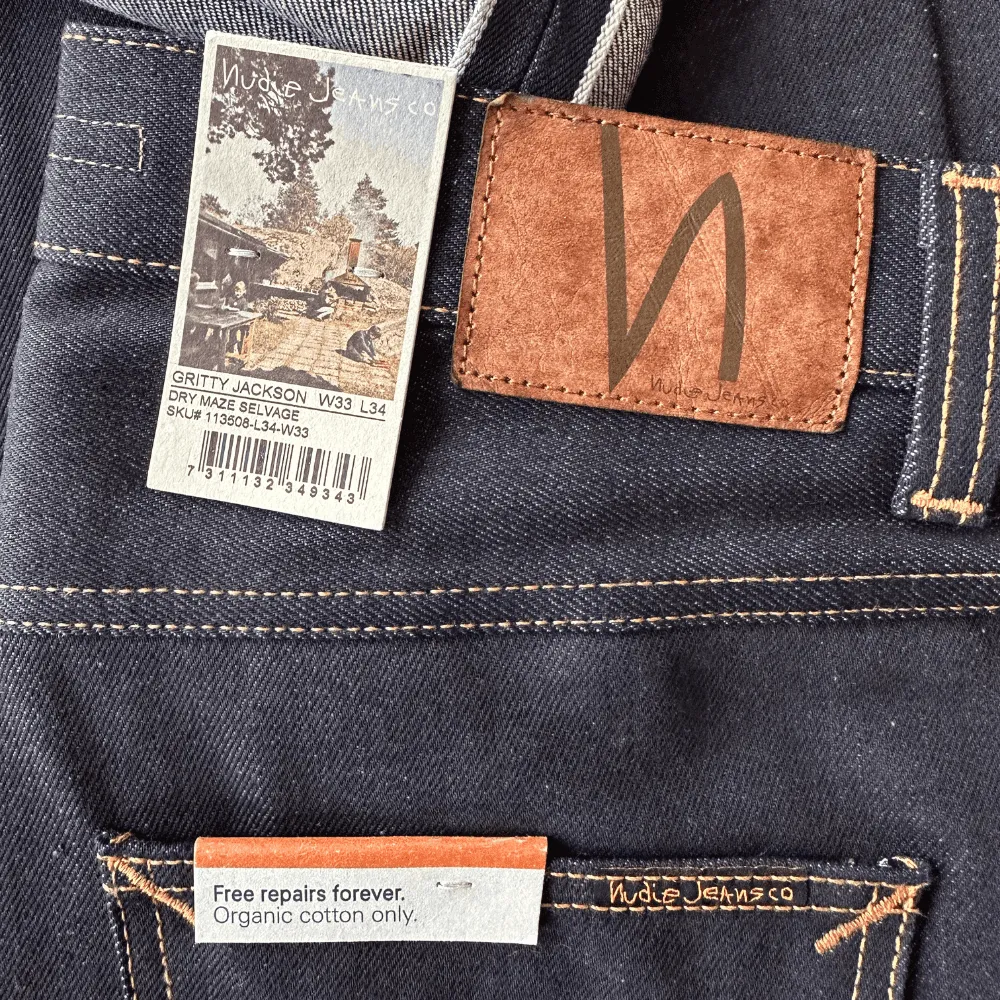
Nudie's "Gritty Jackson" Jeans made from Turkish Selvedge Denim
Sourcing
NJC have a firm focus on the quality and the sourcing of the cotton used in manufacturing their jeans. It’s the first step in controlling the environmental impact farming cotton has on the planet. Using organic cotton removes the risks associated with conventional farming, no toxic chemicals that are found in fertilizers or pesticides for example. This also promotes soil health and increases the range of crops that can be grown in the soil, therefore boosting local economies. No artificial chemicals used at the farming stage means no energy consumption to produce the chemicals either. By using Fairtrade cotton ensures fair working conditions and payment empowering small-scale farmers and pushing the industry to become sustainable.
NJC currently use organic cotton from farms in Turkey and India and denim responsibly manufactured in Japan.
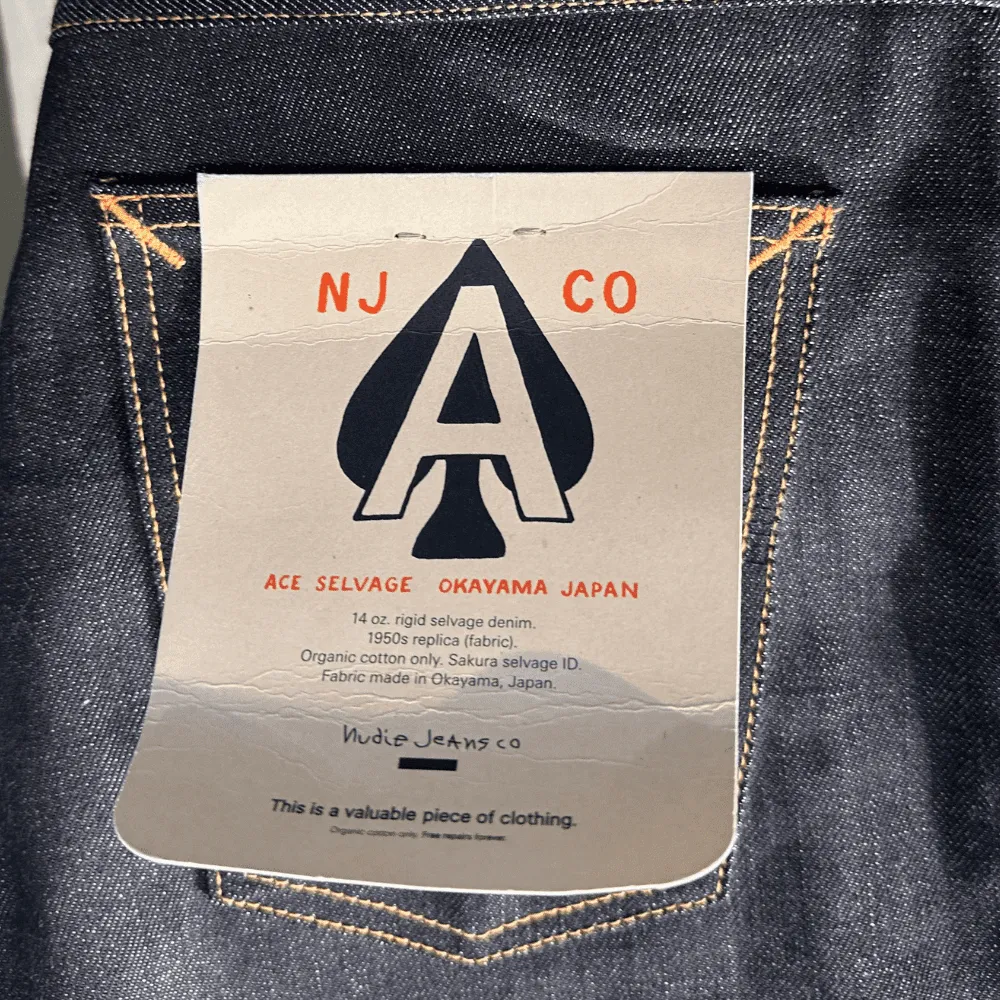
"Ace Selvage" is Japanese selvedge denim from Okayama
Recycled Cotton
Incorporating re-cycled cotton also helps reduce the environmental impact and NJC’s trade-in policy means there’s an incentive for customers to recycle. Recycled cotton can also come from fabric suppliers own waste streams and by recycling products that don’t live up to quality standards in production.
Repairing is caring.
NJC have about 32 repair shops worldwide and offer free repairs for life (wherever possible) on all of their clothing.
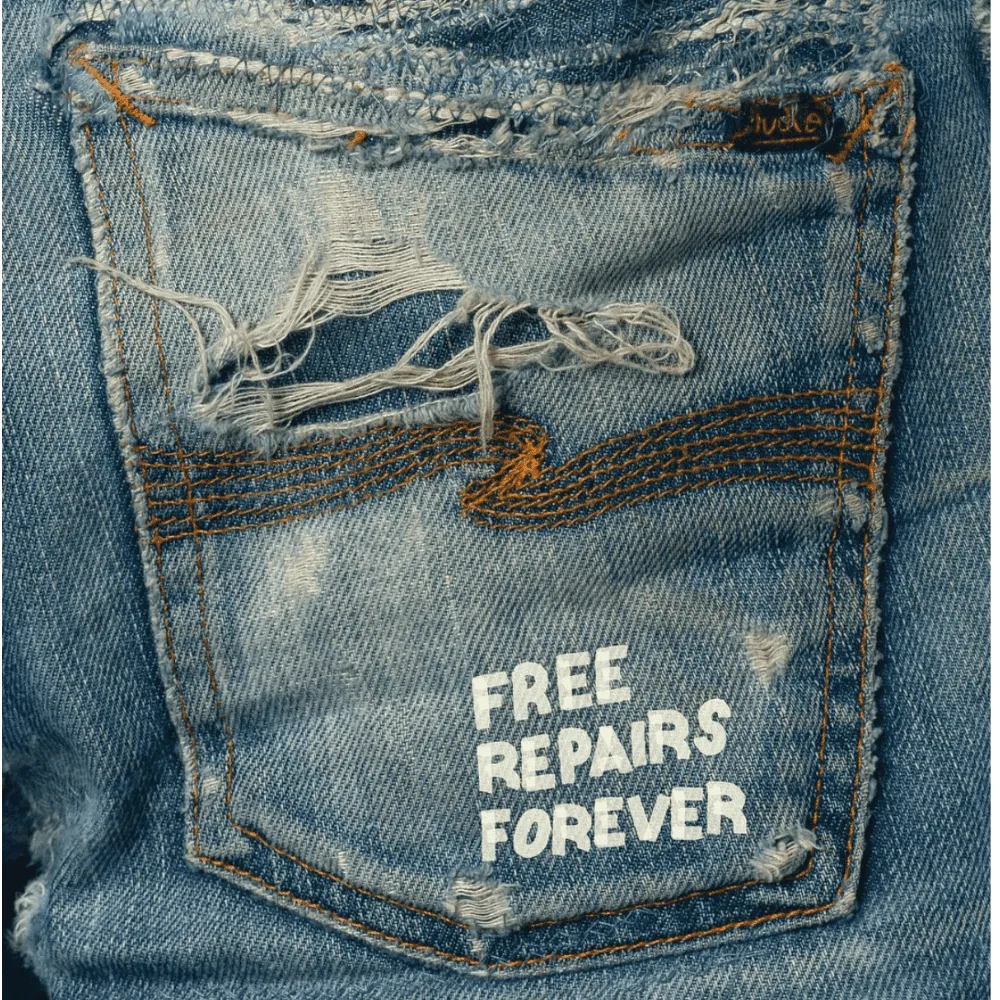
Collections and collaborations.
You’ll find a really comprehensive collection of men’s and women’s jeans at NJC, both in 100% cotton denim and cotton/stretch mixtures. They’ve also done collaborations with various companies and individuals over the years, Amsterdam based high-end denim establishment Tenue de Nîmes and British retailer Oi Polloi for example.
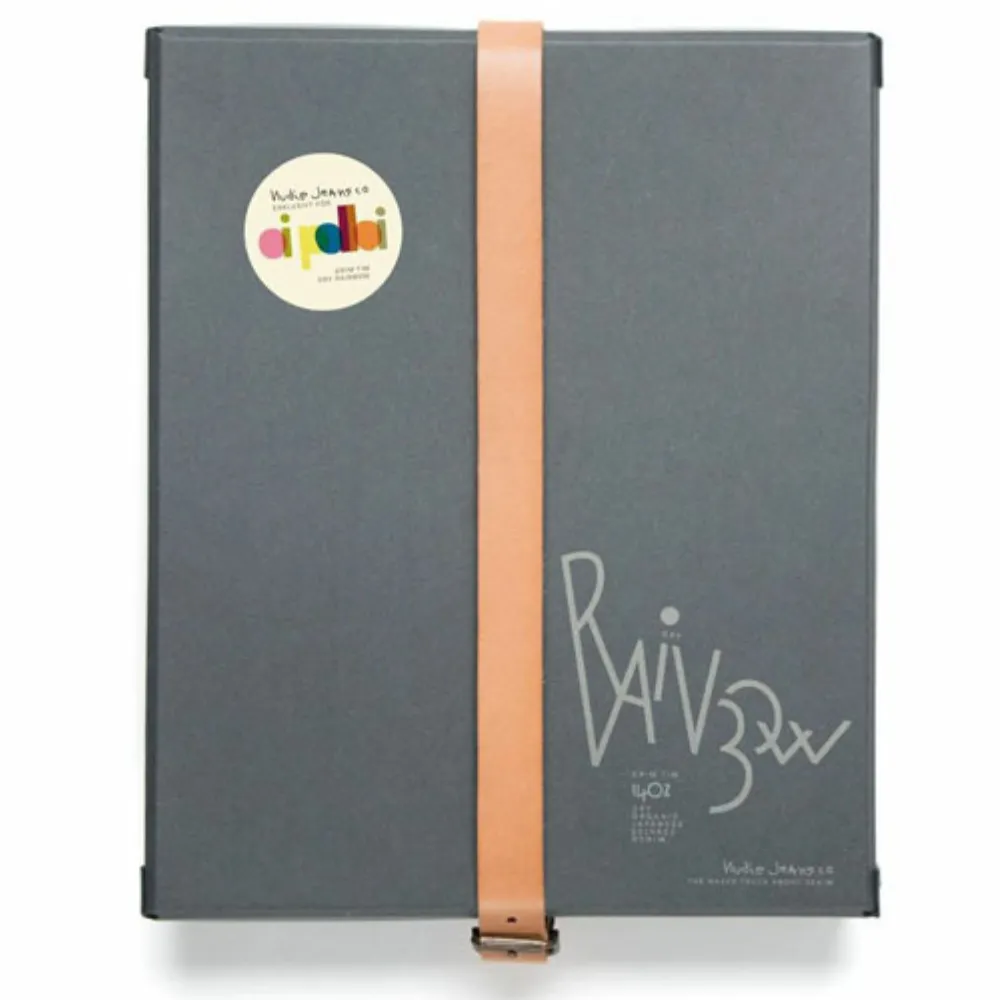
Nudie Jeans Co is one of my favorite jeans brands and over the years I've owned 5 or five pairs of different models. Including in these is a pair or two of stretch denim which do start to deteriorate at the stress points, crotch and back pocket corners, after 2 or three years. These days I tend to opt for 100% cotton selvedge denim for longevity. It might cost more and you might lose a degree of comfort but what you gain is a more characterful fabric that will age well and repair more easily.
Any of NJC’s selvedge collection are definitely worth the investment. I have a pair of ”Lab” Grim Tim’s from 2010, they still have at least another 5 years of rotational wear in them.
“The more you wear and repair jeans, the more character they have. Denim is a living fabric that changes over time – and they are for everyone, of all ages and genders“
- Maria Erixon - Nudie Jeans Founder
I’ll be comparing a pair of NJC ”Gritty Jackson - Maze Selvedge” up against a pair of Lager157 ”Roots Italian Selvedge” for fade comparisons over a year in another article.
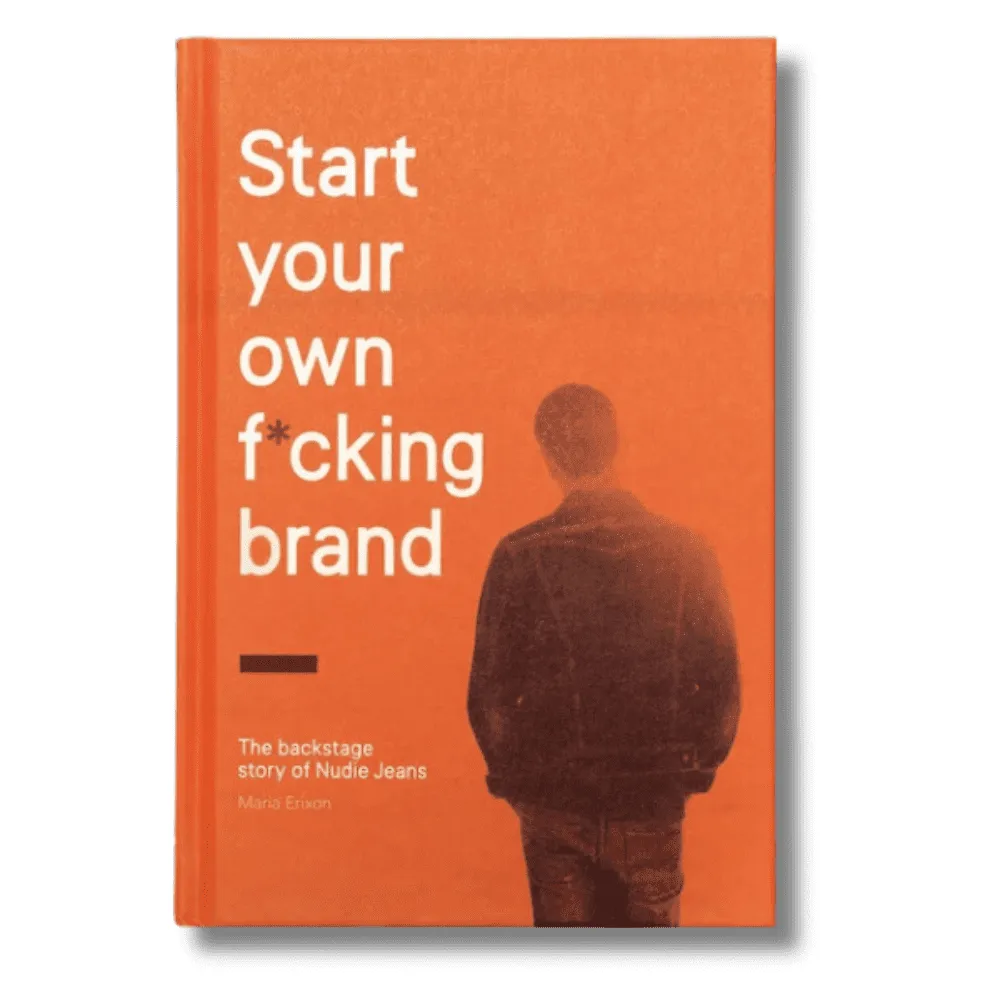
The Backstage story of Nudie Jeans book by Maria Erixon
Jeansverket
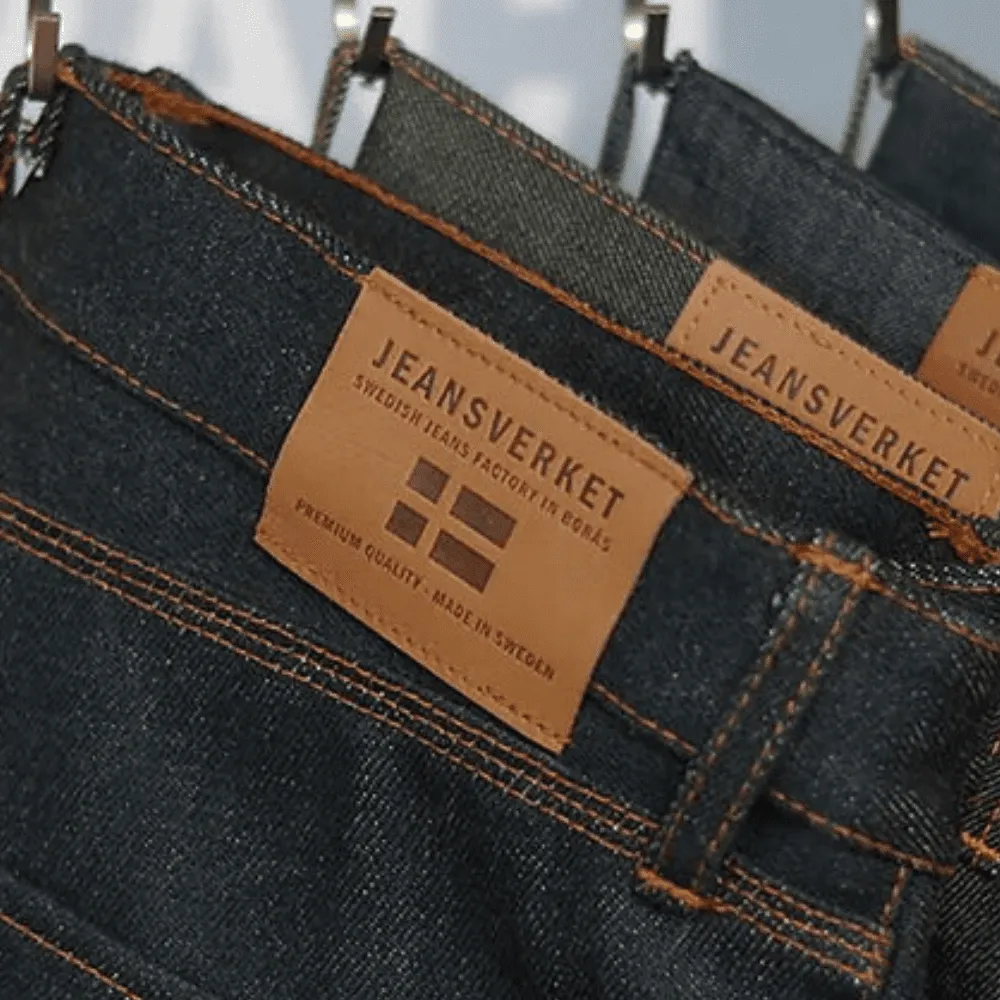
Image courtesy of Jeansverket
Jeansverket (The Jeans Work - loosely translated) comes from Borås, Sweden’s textile home about a 45 minute drive directly East of Gothenburg. The first jeans in Borås were produced in 2010 under the company name of ”Syverket”. The brand Jeansverket was registered in 2017 and launched in 2019. Their aim was to re-think jeans manufacturing by focusing on reduction of environmental waste and creating a sustainable business. To do this Jeansverket reached out to different factories worldwide to supply the latest organic fabrics and natural fibers in order to create the most responsibly produced jeans.
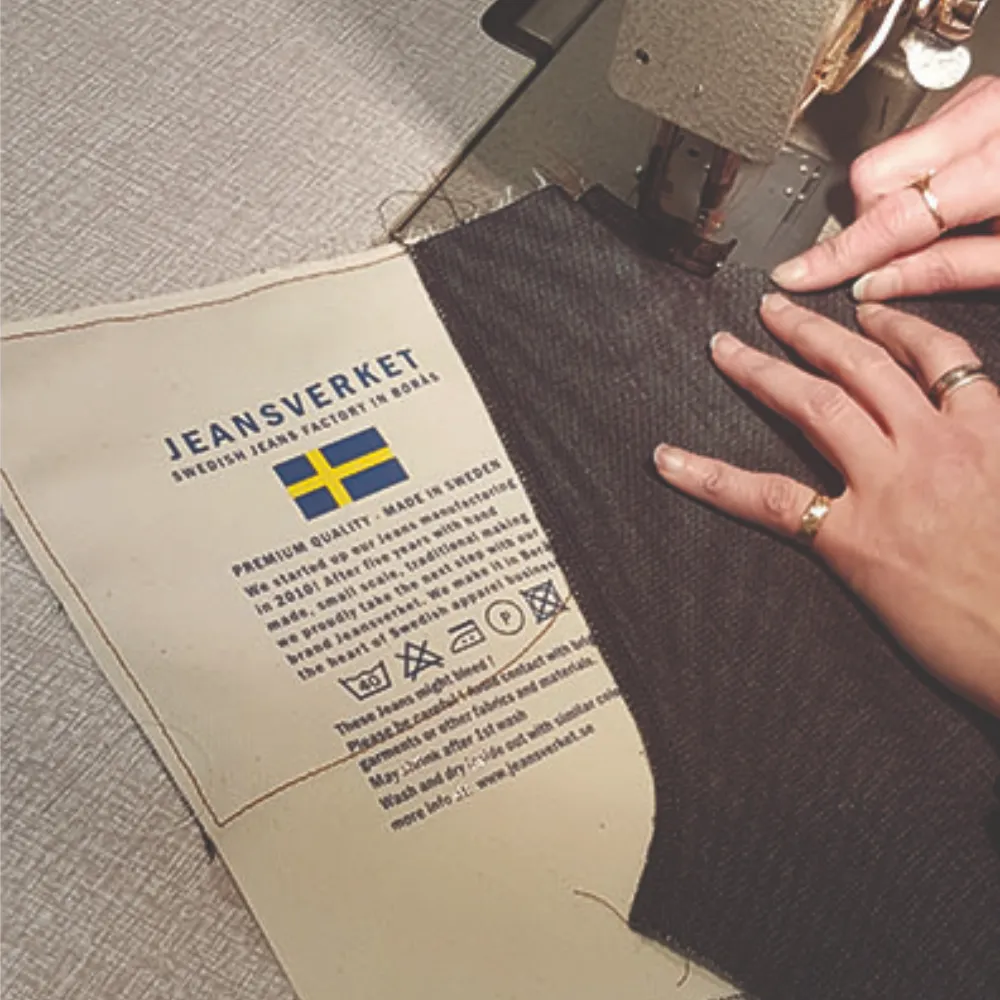
Tailor Made in Sweden - Image courtesy of Jeansverket
On Demand
Jeansverket have a made-to-order process, this helps to prevent overproduction and manages waste while being able to quickly respond to changing fashion trends. During the order process you have the option of choosing denim weight, zipper or button fly. This can take between 2 and 3 weeks according to their web-page, depending on your choices at the order stage.
Range
There's an extensive range of men’s and women’s models to choose from and to add to this, a little over 10 years ago Jeansverket introduced a ”Classic” collection inspired by 1950’s jeans models from Levi’s and Lee.
The collection includes jeans made with 12.5oz or 19oz denim spun by Japanese Kurabo in Okayama and 13.75oz and 13oz denim from The Italian Candiani Denim Company. All come with a embossed buttons, if you order button fly and bio-skin patch.
There’s also a ”Reco” model that comes from reconstituted surplus fabric.
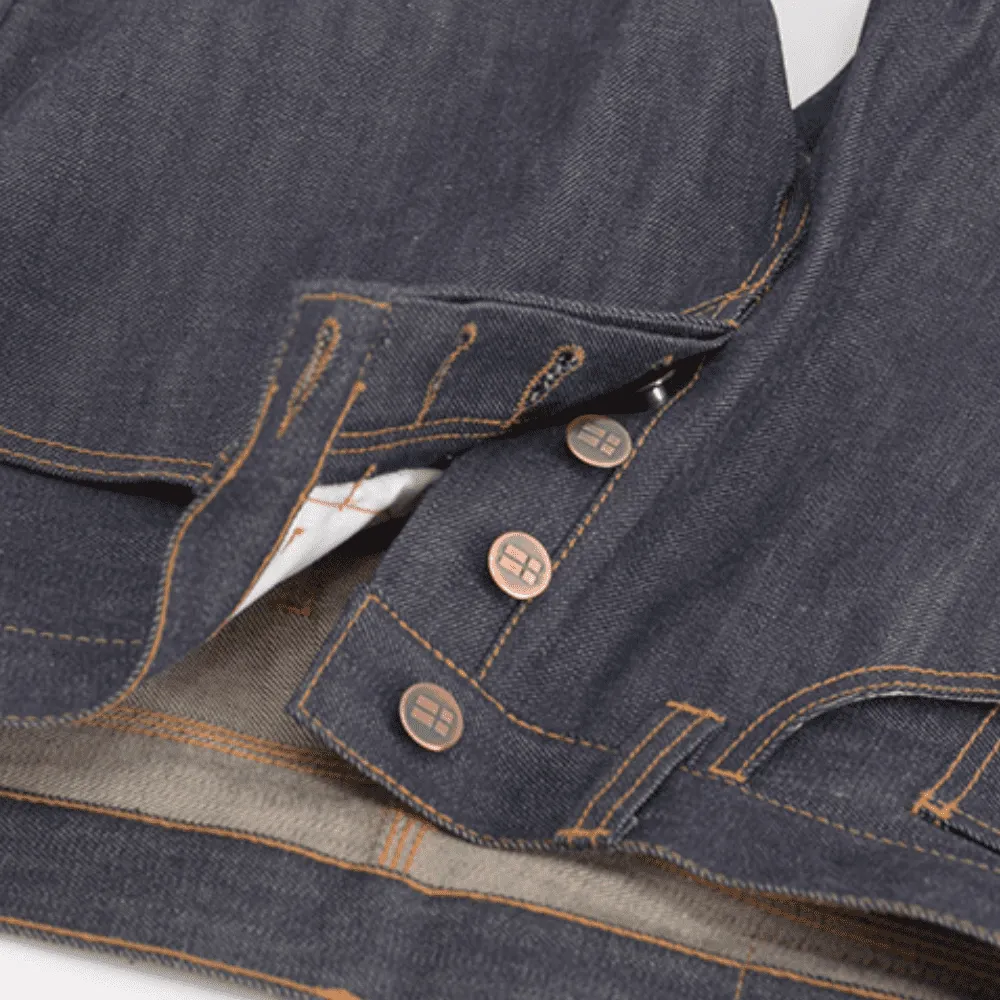
Embossed buttons with the Swedish Flag - Image courtesy of Jeansverket
Circle
The company has a trade-in or ”up cycle” offer so if you have an old pair of Jeansverket jeans, you can send them in and receive $50 off of a new pair. Your old jeans will be cleaned, repaired if necessary and re-branded with a ”Second Life” patch.
Jeansverket has a solid philosophy, good reviews and a good selection of fits and fabrics. Their prices seem pretty fair for a made-to-order product with prices starting from $190 and going up to $300 for their 19oz Japanese denim limited edition jeans.
Indigofera
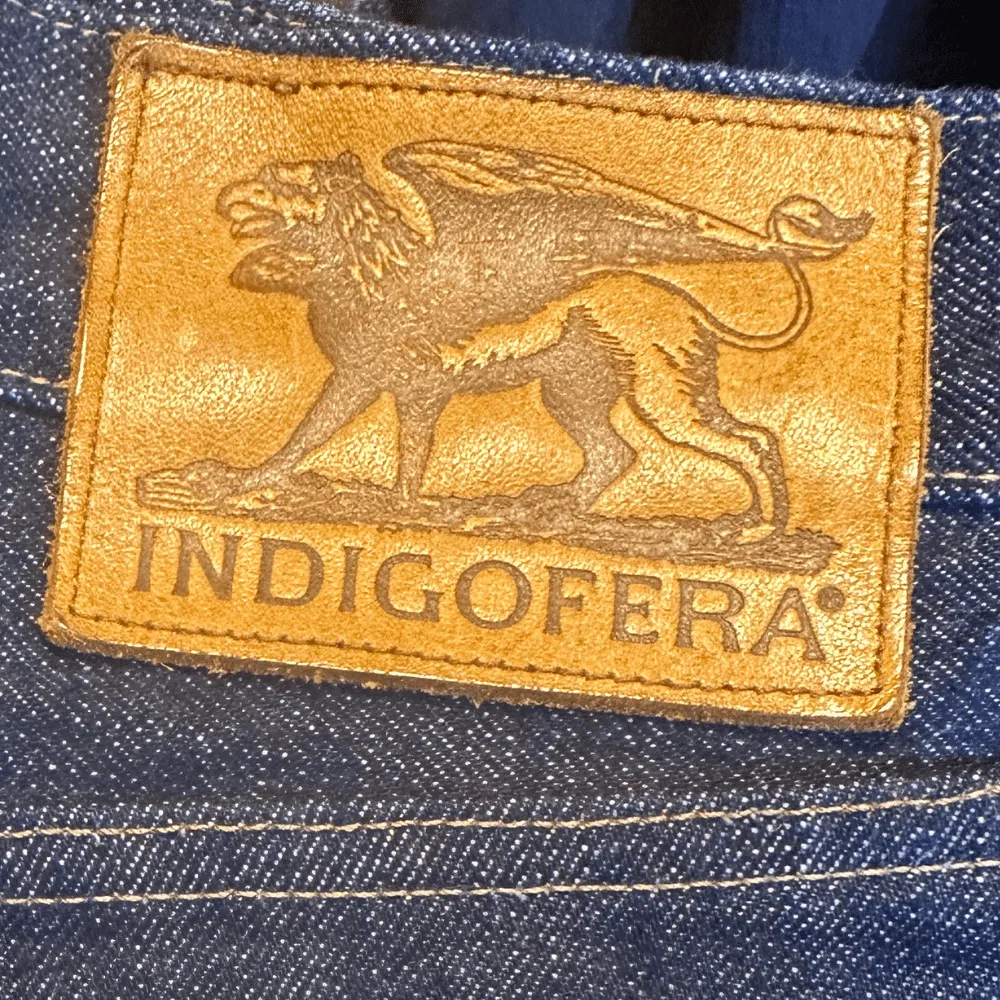
Image courtesy of Indigofera
Mats Andersson first launched Indigofera Jeans in 2009. He started out collecting denim and leather jackets from the 60’s and earlier. His hobby led him to work in vintage stores and with different denim brands ending with him at Levi's as a commercial director by 2003. At the end of 2004 Mats left his job at Levi’s and founded ”The Grocery“, a distribution company working with Cheap Monday and Edwin.
In 2007, Mats and his former business partner, Johan Söderlund, began working on Indigofera. By spring 2009, the first products were delivered to stores. They felt they had to explain what the brand was all about before they could celebrate their achievement.
”There was a desire to bridge the gap between what has been and what will be. That is to say, the company goes beyond the pure manufacturing of denim and focuses on an aesthetic and quality that would have been at home in the 1950’s and is still relevant and innovative today”.
- Mats Andersson

Indigofera advertising image - Courtesy of Indigofera
Production
The company today is made up of three international components. It’s offices in Stockholm. Importing Japanese selvedge fabric from Nihon Menpu and high end tailoring in Portugal. Their jeans are available across Europe, the United States and Canada with limited stockists in Australia and Taiwan.
During it’s history Indigofara has done many collaborations with artists from around the world including American musician Israel Nash amongst others.
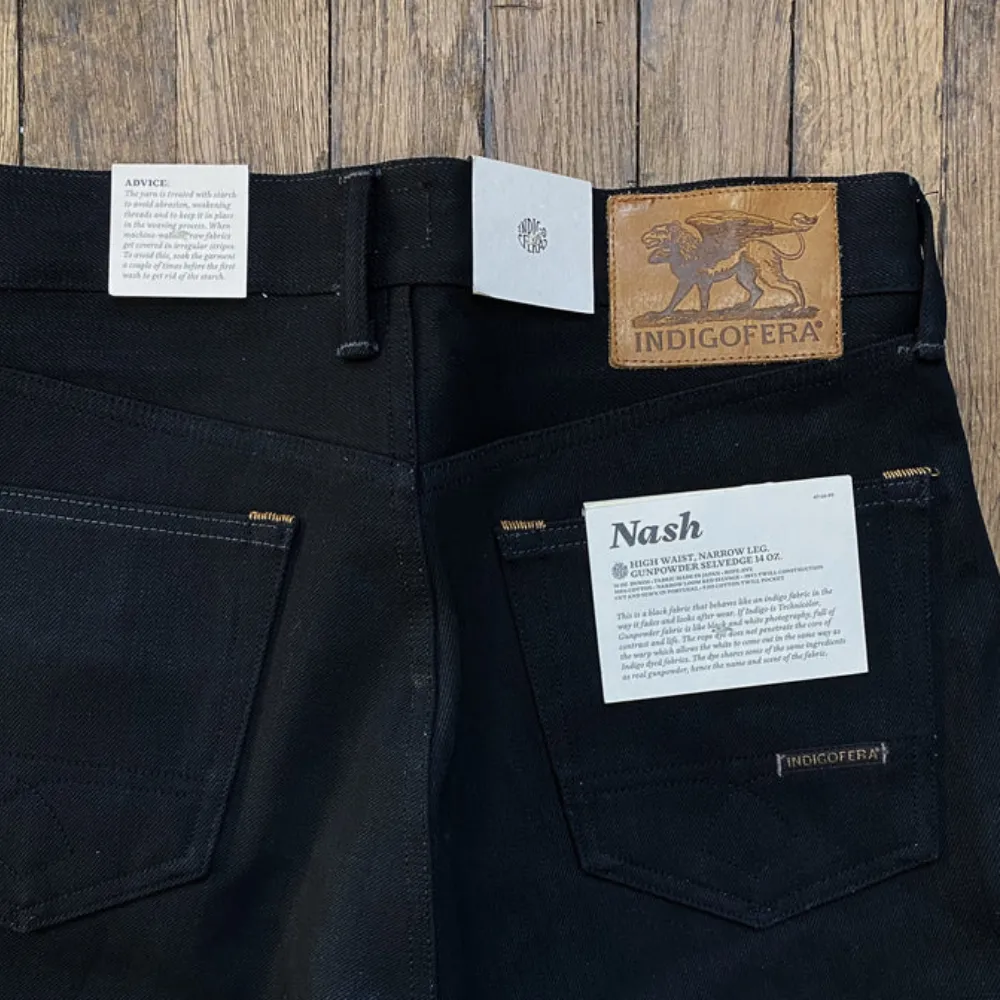
Indigofera’s ”Nash” jeans from the collab. with Isreal Nash - Image courtesy of Indigofera
Collection
Indigofera jeans have six men’s jeans models at the moment, I couldn’t find any women’s products in their online store. They run from around $200 - $300 which is about average for a decent pair of Japanese selvedge denim jeans. They’re really well made and have great fades depending on you choice of denim weight.
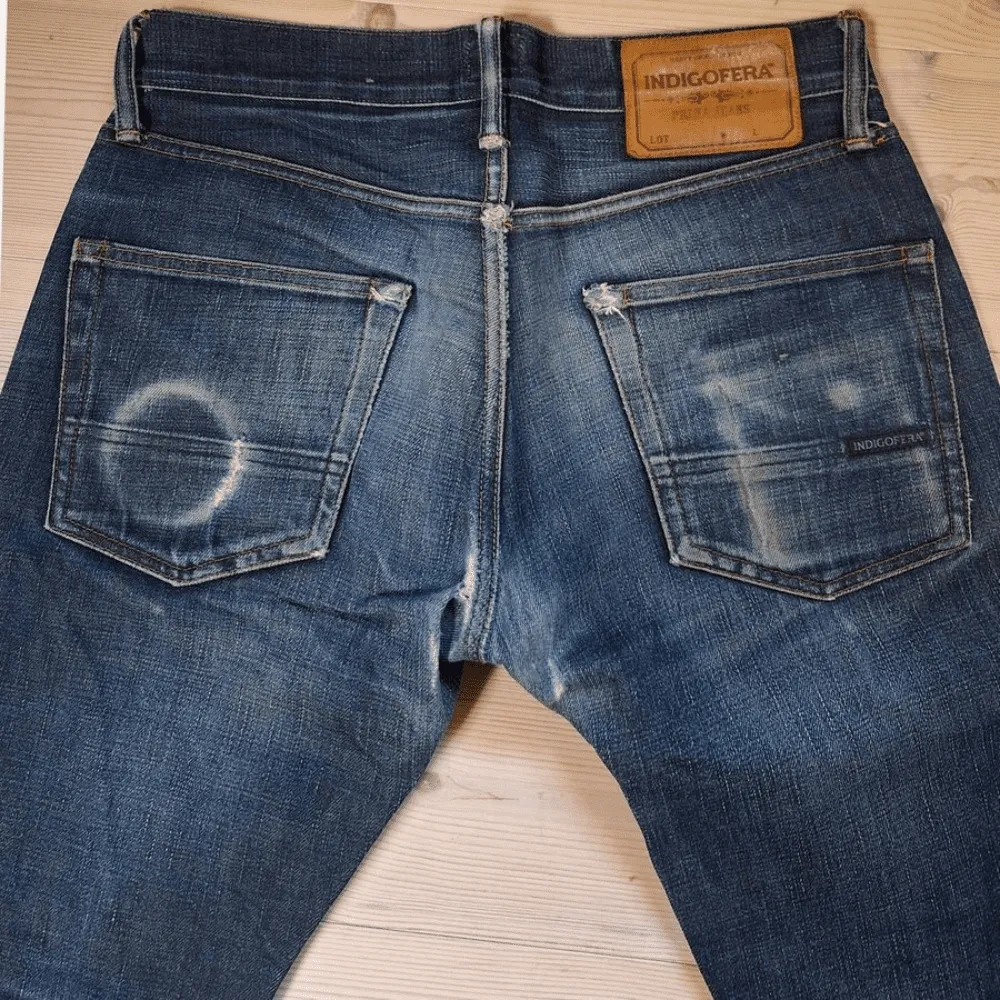
What you can expect from around 5 years wear and tear, depending on usage - Image courtesy of Indigofera
Philosophy
A philosophy doesn't have to complicated, in fact the more uncomplicated the better. Indigofera's philosophy is:
"Every choice in every detail that we construct, is labored over as if our lives depended on it. Every stitch, every button, every line is controlled by our obsession with delivering PRIMA".
In Swedish the word "Prima" means quality and according to Indigofera this is only attained with consistent craftsmanship and by using the best fabrics, tailoring and detail attention at every point in the production process.
They go on to say that Prima is also about living life to the fullest, whether it's the inspiration from sitting around a campfire in California or constructing the coming season's collection at the Stockholm office.
"PRIMA is to be lived in, adventured in, and taken to the limit. PRIMA endures all the ravages of both the road and the fickle ebb and flow of fashion. PRIMA is its own assured guarantee. INDIGOFERA is PRIMA".
SOSO Clothing
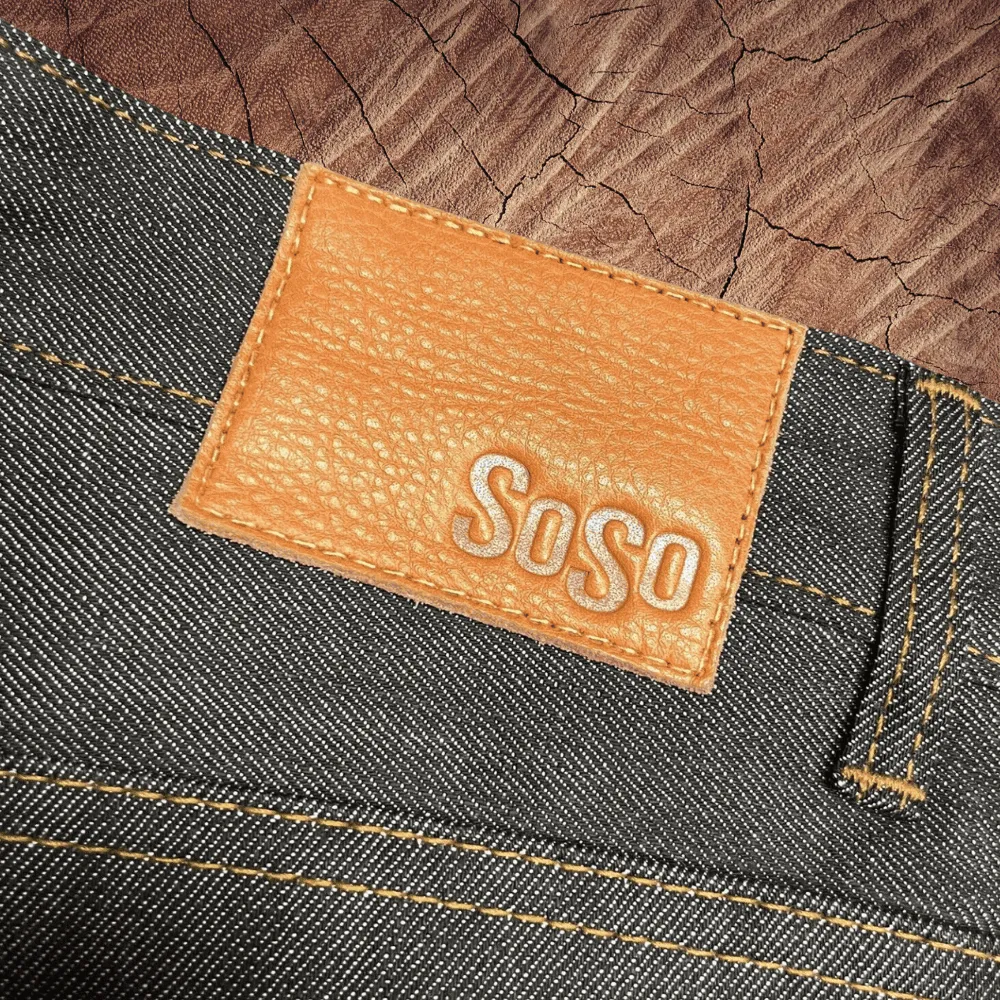
Image courtesy of SOSO Clothing
In September of 2012 SOSO Brothers established themselves as the world’s most inexpensive custom made jeans brand. The company SOSO Clothing was started by Jannis Hoff and Johan Blom in 2010 and later in 2017 joined by Fredrik Milton Schoultz.
Their ethics are simple:
”We deliver a sophisticated “anti-fashion” concept with a fair price. We are miles and miles from fast fashion.
We focus on producing garments with fine finishing details and tailored fits while fully embracing denim and workwear heritage”.
Based in Umeå, Sweden’s 13th largest town and almost 400 miles North of the capital Stockholm, they literally are miles and miles from fast fashion.
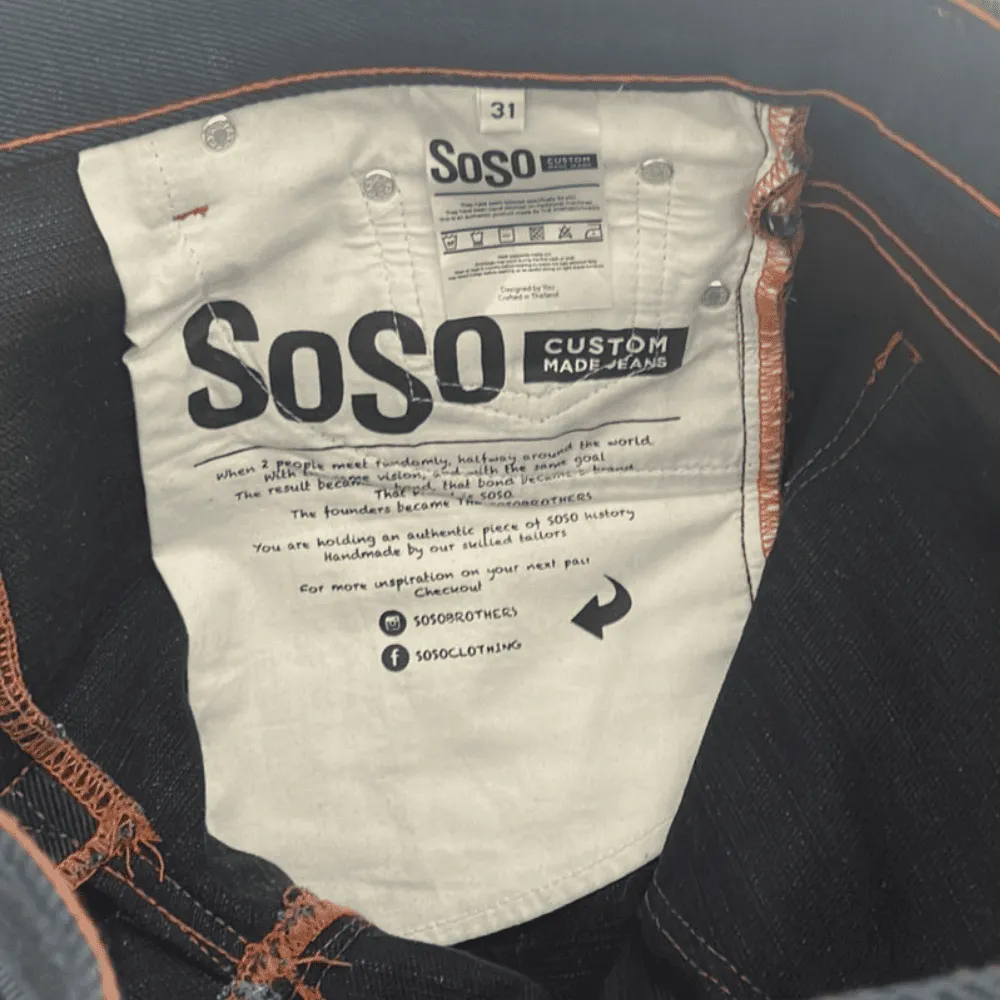
Jeans pocket fabric - Image courtesy of SOSO Clothing
Custom Made
Through their online store SOSO Clothing lets you to choose your denim, customize your cut, and refine your choice with a broad selection of detailing. Their denim fabrics come from mills in Japan and China and come in weights ranging from 10oz up to a leg braking 33.14oz. Construction is done at a small factory in Bangkok, by between 4 and 10 employees depending on workload.
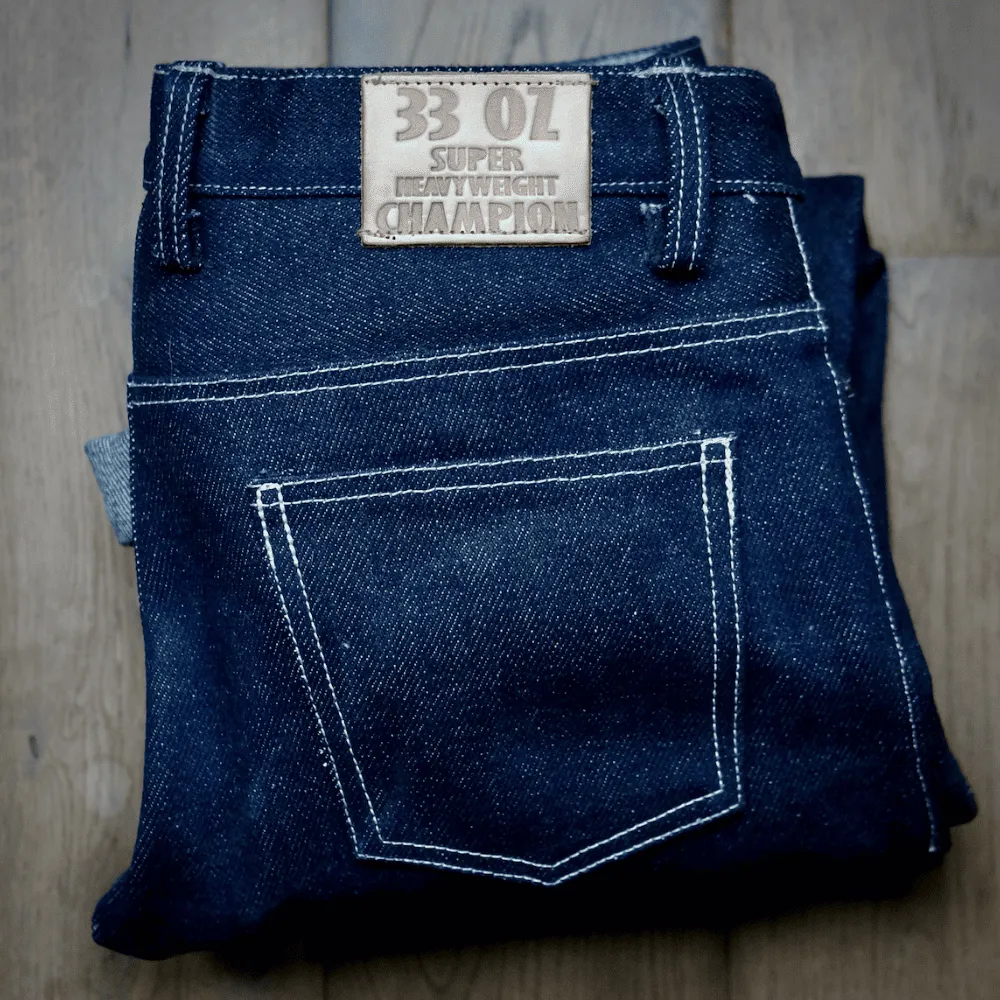
SOSO’s 33OZ-TBOL weighs in at 33.14 oz (939g) and is woven on vintage GA1515 shuttle looms—a nod to traditional craftsmanship. These machines require manual adjustments to handle the weight, with each pair taking up to a week to complete due to their heft.
- Image Courtesy of SOSO Clothing
Hitting Their Mark
To differentiate themselves from other jeans brands SOSO hunts down limited and dead stock selvedge denim from every corner of the globe and add interesting textures and beautiful materials to provide something truly unique for their clients. With exceptionally high standards and the promise to put quality before quantity, they really hit the mark in creating something both the company and customer can be proud of.
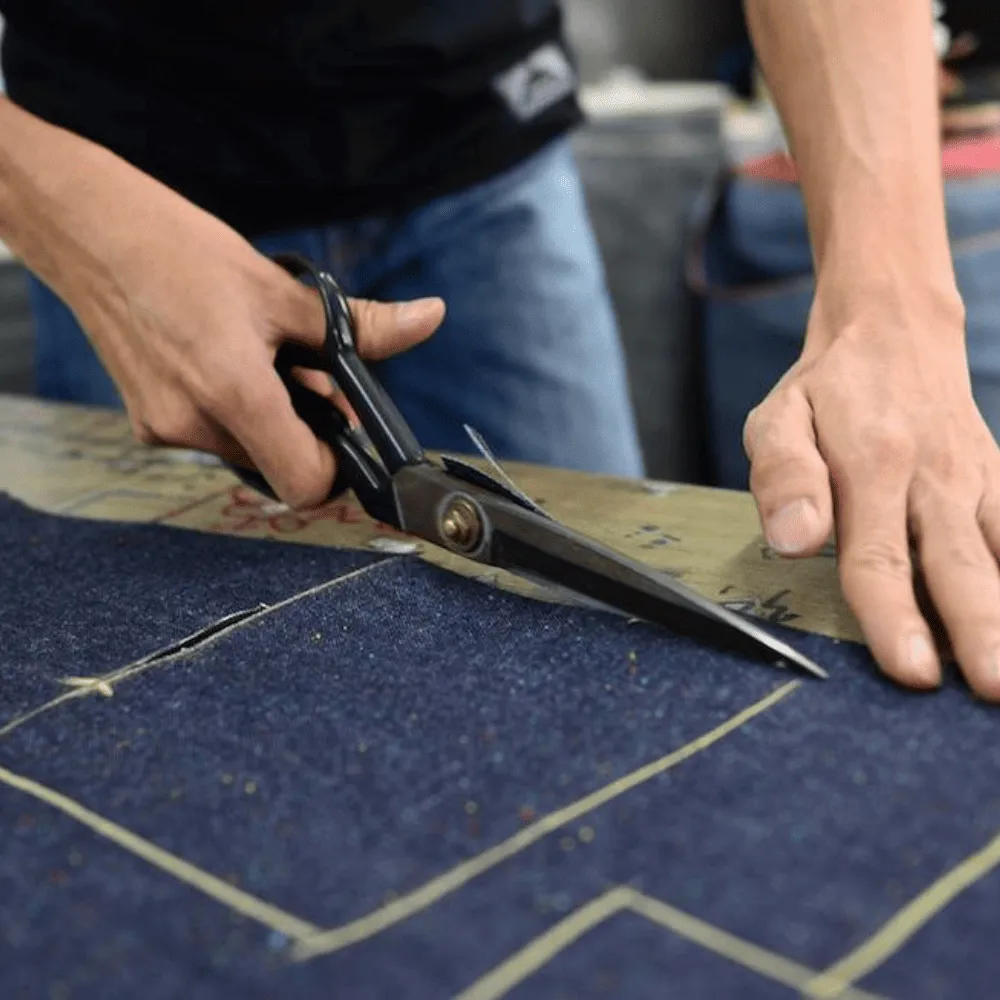
Cutting the denim - Image courtesy of SOSO Clothing
Serious Commitment
The company takes it’s responsibility to maintain the heritage of tailoring very seriously. To help achieve this, traditional machines such as Japanese Jukis and American Singers are used in their jeans production. Most importantly, they use the Union Special, the legendary flagship sewing machine that is responsible for the iconic rope look that denim aficionados expect in their jeans’ hems.
”Denim just isn’t properly denim without that trademark Union Special lock stitch”
-SOSO Clothing
SOSO Clothing is a relatively small operation, but can still proudly say that they have some of the fastest and heaviest custom-made jeans you’ll find anywhere in the world.
Lager157
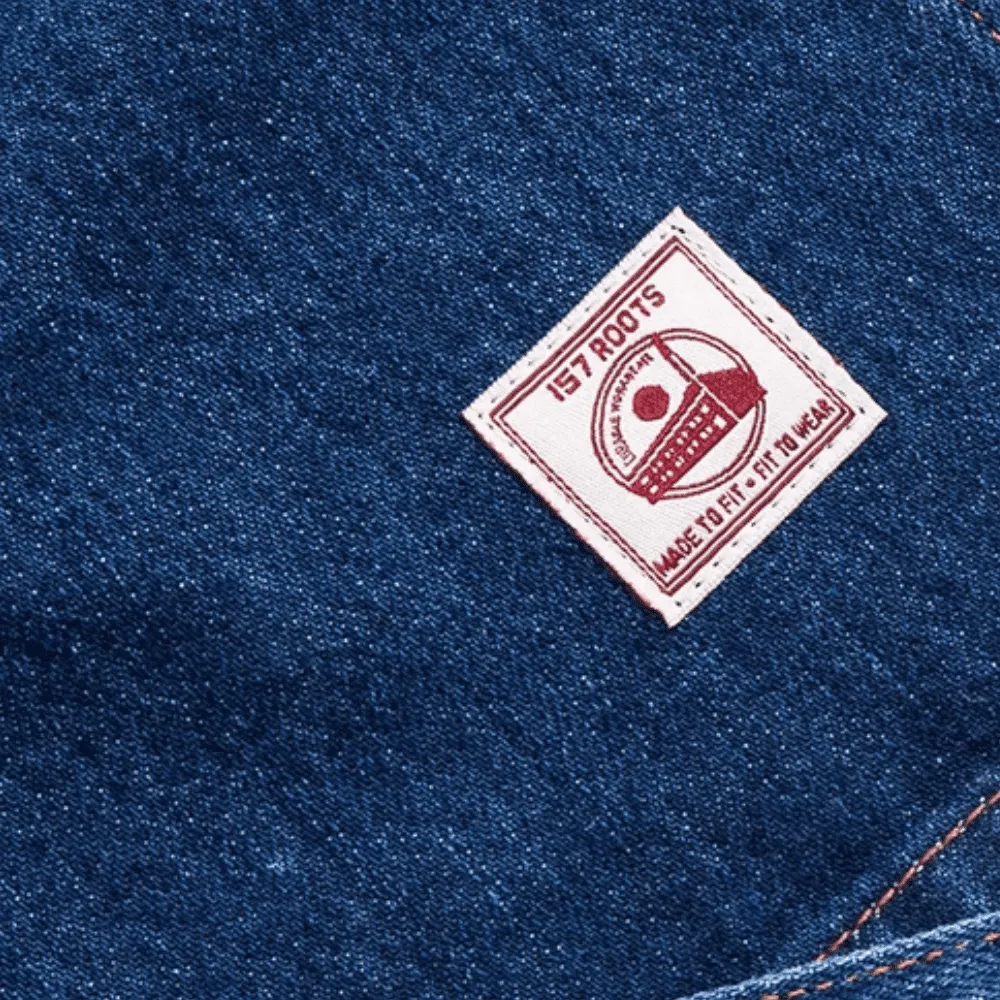
Image courtesy of Lager157
Lager 157 has it’s head office in Gällstad just outside of Ulricehamn, about an hour to the East of Gothenburg. The name comes from the 157 main road that passes close to their very first store located in Gällstad.
The company that was started in 1999 by entrepreneur Stefan Palm only has stores in the Nordic region. They sell basic clothing for the whole family.
I’ve added them to this list because they have a great jeans selection which includes a few Italian Selvedge models in their ”Roots” collection and I’ll be comparing them against a pair of Nudie Jeans in another article for value, fading etc.
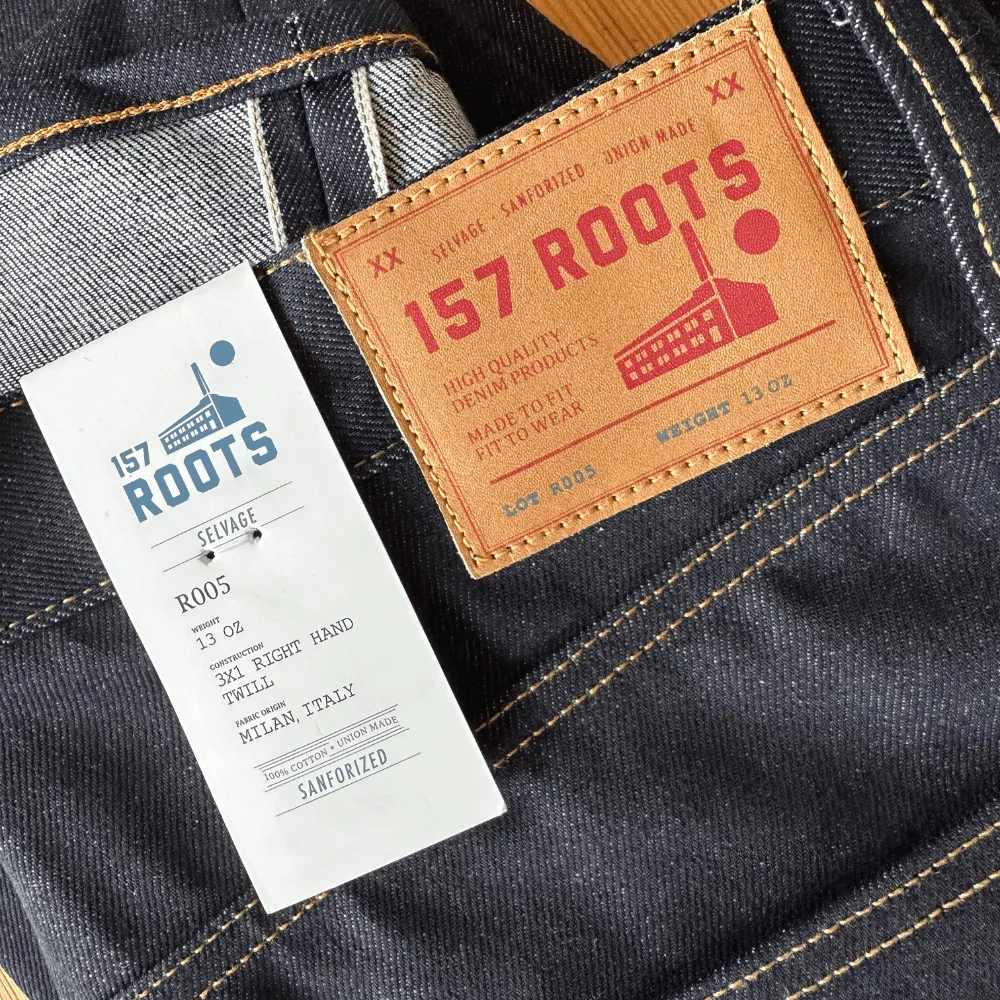
Lager 157's 13oz, 3x1 Italian Selvedge jeans.
Fabrics
As I mentioned, Lager 157 is a clothing company and have a great variety of items including jeans. In their selvedge range they currently have four models of jeans, two ”regular” fit, one in 13oz denim and one in 13.75oz. And two ”loose” fit models, one in 13oz and one in a heavier 15oz fabric. All of which come from the Italian Candiani denim factory in Robecchetto con Induno, Italy and have tobacco and light yellow stitching and copper rivets. These are a great entry point for anyone wanting to get into selvedge denim as they are priced at only $60 and $80 respectfully.
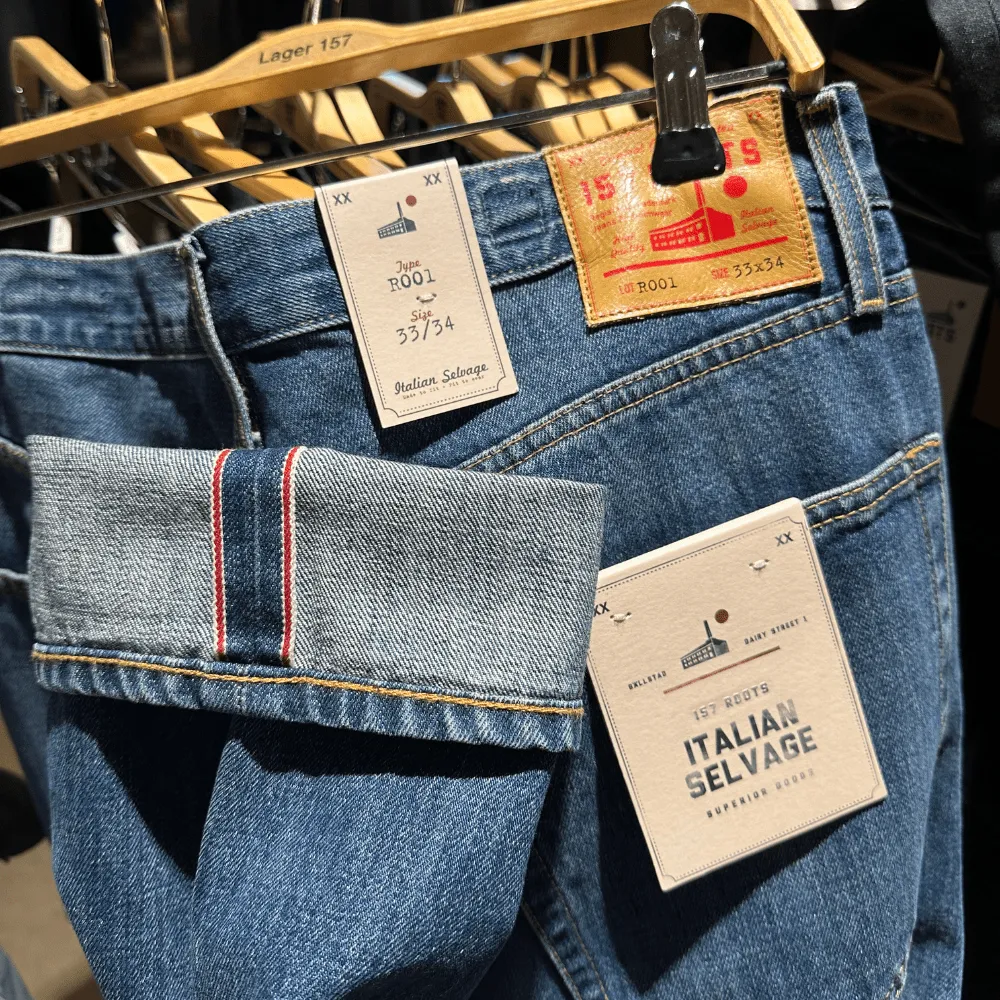
Lager 157's Stonewashed Italian Selvedge jeans.
Cheap Monday
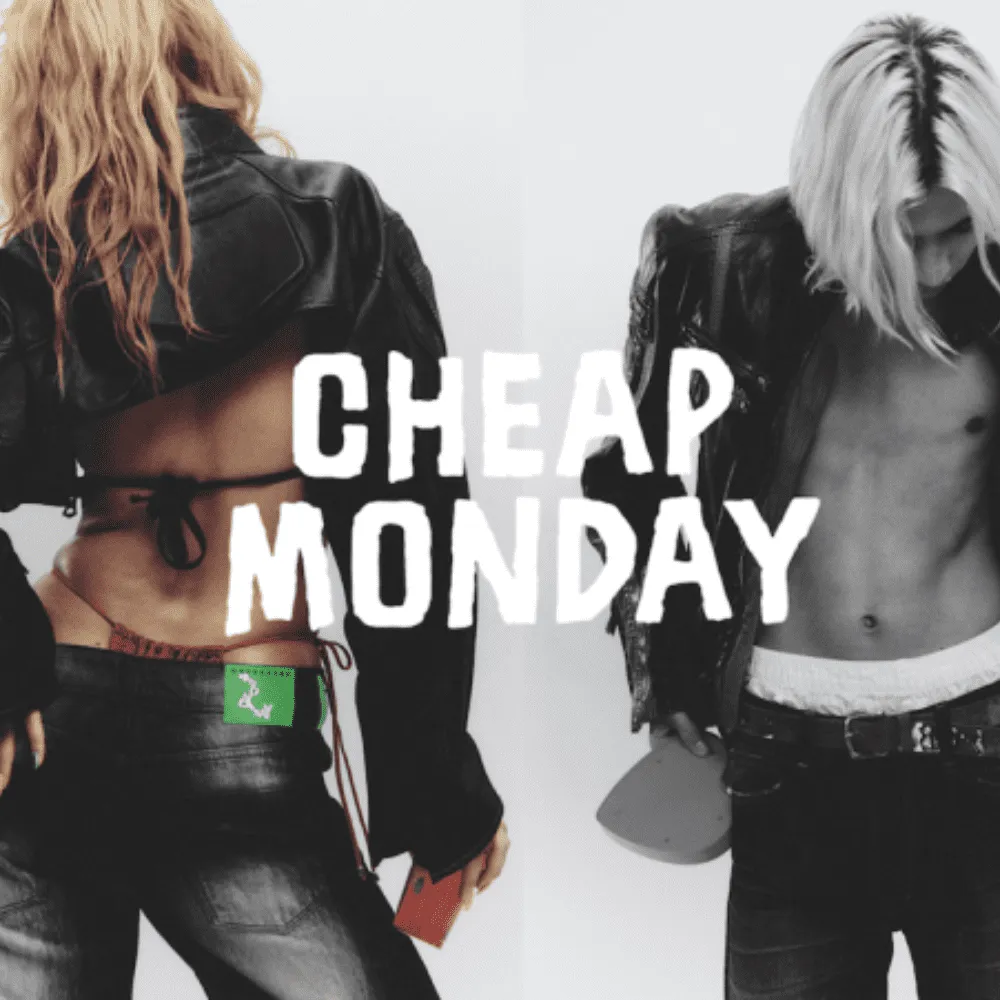
Image Courtesy of Cheap Monday
Cheap Monday was born in 2004 and was the creation of Örjan Andersson, Stockholmer and jeans professor and Adam Friberg who was working for JC in Borås at the time.
”At this time I was working at JC, but loved second hand. Since I always worked weekends, I could only look for second hand clothes on Mondays”.
- Örjan Andersson explaining the brand name "Cheap Monday"
Cheap Monday went against the low-waisted bootcut jeans trend in Sweden at the time, having a tight fit with an extremely skinny silhouette and high waist, made popular by the U.S band ”The Strokes”.
This was before the introduction of stretch denim, these jeans were 100% cotton and must have been a nightmare to get into!.
Cheap Monday really paved the way for the modern ”skinny” jean model and were a contrast to the high end exclusive jeans brands in the 00’s. The brand was distributed by ”Grocery Store” owned at the time by Mats Andersson now owner of Indigofera Jeans.
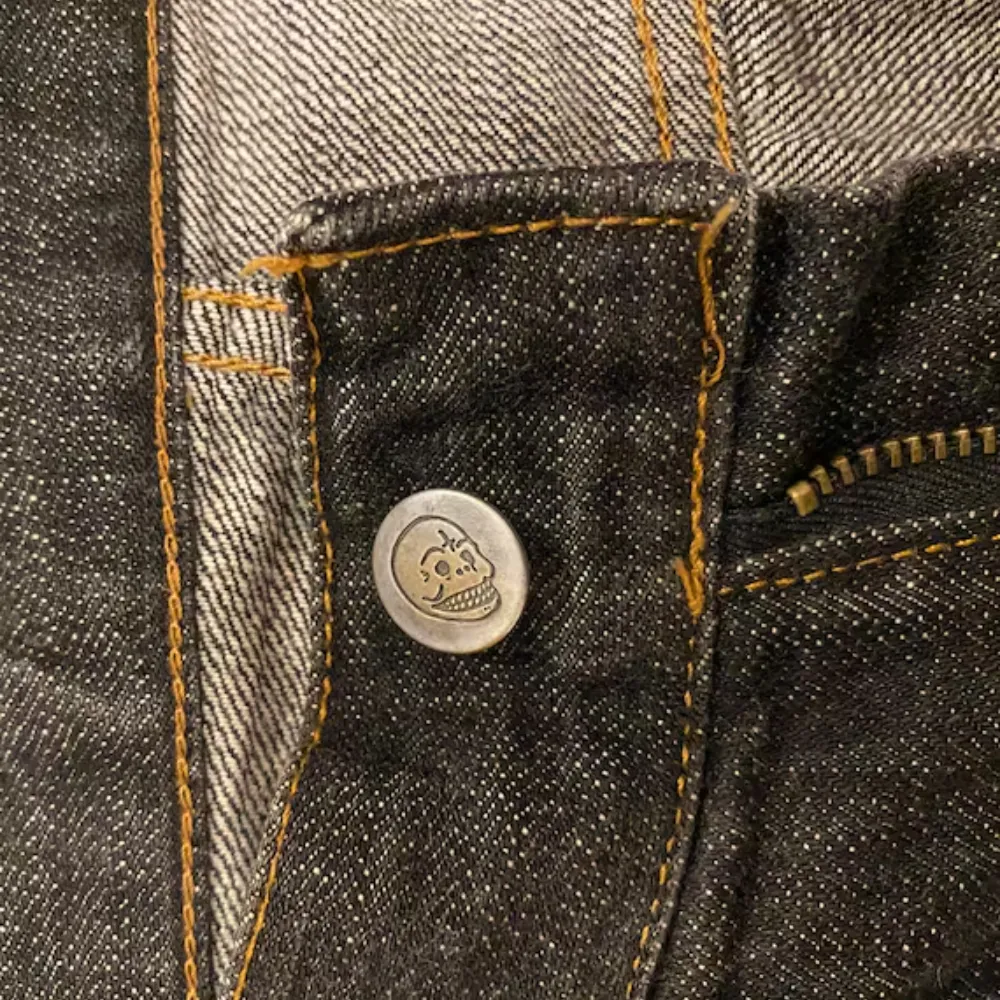
Image Courtesy of Cheap Monday
H&M Buyout
In 2008, H&M bought 60% of Fabric Scandinavien, the group that then owned Cheap Monday and in 2018, after declining sales, discontinued the brand.
This summer, in 2024, Cheap Monday will return by offering a core collection of jeans and to be sold via weekday.com and in selected Weekday stores and retailers in Sweden.
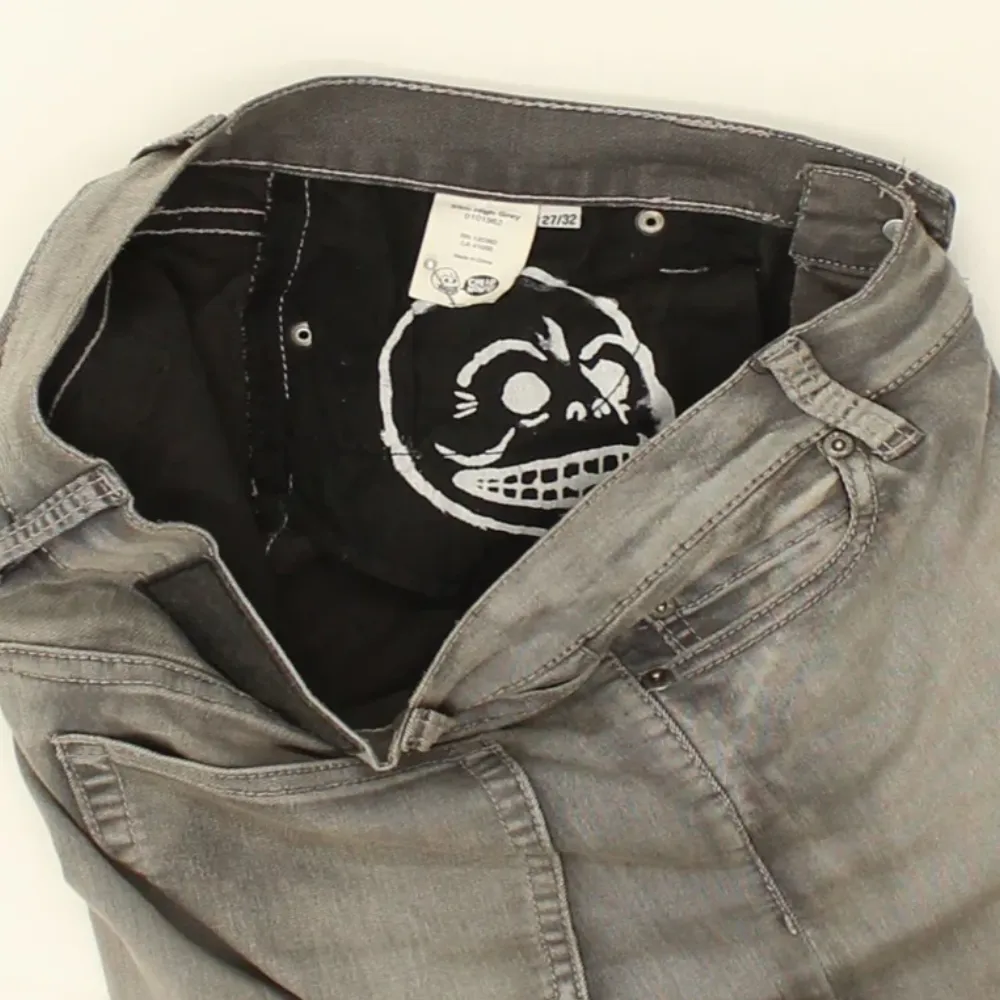
Image Courtesy of Cheap Monday
Legacy
It’ll be quite nostalgic to see Cheap Monday’s jeans back in the shops after 14 years. I’ve never owned a pair but they certainly were popular in Sweden back in the 00’s and have left their legacy by setting a trend of skinny jeans that are still popular today with Swede’s.
I have no affiliation or commercial connection to any of the brands or companies mentioned on this site.
All content on this site is original unless otherwise stated. In instances where original content could not be provided, a link to the source has been included. If you are the rightful owner of any material featured here and would like it removed, please contact me at:
